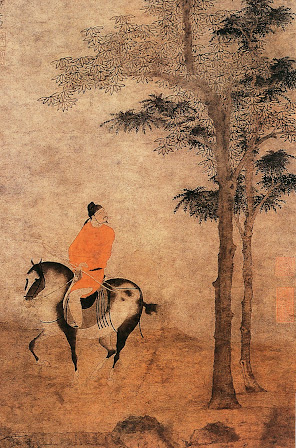by Brett Rutherford
Emperor Li
Yu (937 – 978 CE)
Now I am dead.
There is no other way
to write this poem
except backwards.
Because Taizong
resented my last poems
(who would not yearn
for what he has lost?) —
because I am said to be
all things considered,
a better poet.
Because I cared less
with each day’s passing,
wife torn from me,
a weeping shell of herself,
since she was raped
by the Song Emperor.
Because I will not address
that personage correctly,
because I am now called,
not former Emperor, not King,
not as Li Congjia, the name
my father gave me,
the name to which
all people and foreigners
knelt and kow-towed,
but by an epithet:
Marquis of Wei Wing
(Lord of Edicts Disobeyed).
Now I am dead,
because my generals came
with warlike strategy,
and I dismissed them,
preferring my evenings
in the Poets’ Pavilion,
with painters and artists
who fled to me from
every other kingdom.
Now I am dead,
because my captive brother
summoned, implored,
my travel to Song’s capital,
and I went not. Instead
I sent poems and art,
the best ambassadors
of peace and accord.
Now I am dead.
No armor did I don,
no chariot ascend
when the invaders came.
I was in the temple,
composing a poem,
surrounded by monks,
incense, and prayer wheels,
when they broke in
and seized me. Where
was the magic, then?
Now I am dead,
because wise counselors
wanted me strict, cruel
and cunning, like those
who raced to crush
our borders. Refusing,
I sent them home.
Some killed themselves
in honor’s name.
It was I who killed them!
Now I am dead,
who tried to have
one woman as wife,
and her younger sister, too.
As for the two women,
one died, and then I married
the other. Is that not honorable?
Did I not carve,
with my own hand
two thousand characters
on the Empress’s tombstone?
Those who forbade my love,
and my second marriage,
I sent home to their villages
to live until their beards
touched ground.
Now their ghosts haunt me.
Now I am dead,
because I drank a cup,
an overflowing cup
of heart-warm wine,
best of the southern
vineyards, I was told.
Because my dishonored wife
put her pale hand
upon the celadon vessel
to taste it first,
and a soldier pushed
her aside and said,
“This wine is for one,
from the Emperor’s table.
The Marquis only must drink.”
“I am not thirsty,” I said.
“The Marquis must drink.
I must say at his table
that you have tasted it,
and in full proof of pleasure,
have drained it to the dregs.”
Now I am dead,
because the willows of home
have wept two years for me;
twice have I left unswept
the tombs of my fathers;
twice have I failed to lift
up in the dead’s honor
a flagon of chrysanthemum;
and twice has the Lunar Year
come and gone in a place
that no longer has my name.
Peace be to you, Song Emperor,
and to all peoples. I am still
King of leaves and petals, Lord
of moonlight and sudden breezes.
Who will they read
a thousand years from now?
Now I —





